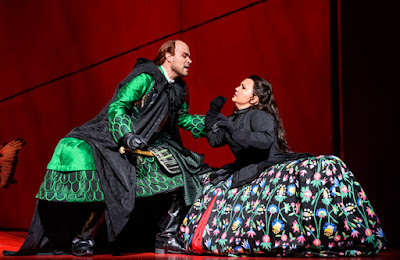James Karas
Mitridate, re di Ponto is an early opera seria by Mozart that is beautifully sung, marvelously
directed and superbly played at the Royal Opera House, Covent Garden. These
succinct praises are not frequently or obviously associated with this opera,
but more about that later.
Opera seria, of course, means arias to express emotions and recitatives
to advance the plot. There is no chorus and almost no ensemble singing except
for a couple of duets. For example, when Sirafe and Aspasia sing the duet “Se
viver non degg’io” (If I cannot live), they face the audience, walk around the
stage and never really relate to each other.
Bejun Mehta and Albina Shagimuratova in Mitridate; re di Ponto at Royal Opera House, London
The genre was dumped in the latter part of the 18th century
but there is no reason to put our nose up because style and substance changed. Mitridate
is enjoyable on its own regardless of any shortcomings or prospective changes
in style. In other words, look upon the
donut and not upon the hole.
A smidgeon of plot. King Mitridate has two sons who don’t get along; to
wit Farnace wants the king’s job and his fiancée Aspasia and Sirafe who also wants
Aspasia. Meanwhile Mitridate who is supposed to be dead but is not, imports
Princess Ismene as a wife for Farnace. Aspasia loves Sirafe, Farnace does not
want Ismene and, well, you get the idea. Love, honour and treachery in opera
seria are analogous to riding a bicycle: once you learn it you never forget it
but you can change as many bicycles as you want.
The performances are vocally outstanding. American tenor Michael Spyres
takes on the name role with aplomb. He has a light tenor voice that is flexible
and reaches the high notes with ease. Many of the arias are done at a brisk
pace but there some very moving moments. Mitridate has some nasty
characteristics but near the end he becomes noble and forgiving and Spyres
rises to the occasion with beautiful emotional cadences. This is a five-star
Mitridate.
Soprano Albina Shagimuratova with her sumptuous voice gives us an
Aspasia of vocal splendour. When she sings the recitative “Ah ben ne fui presage” (Ah my foreboding was justified) and the cavatina “Pallid' ombre" (Pale shadows) she reaches an expressive and lyrical majesty
that clearly presages “Dove sono.”
Soprano Lucy Crowe sang the Princess Ismene. She is given to Mitridate
as a slave and she tended to tilt her head to the side and I thought it was an
indication of humility and servitude. Her singing and portrayal is highly
accomplished.
Georgian Soprano Salome Jicia and American countertenor Bejun Mehta sang
the sons Sirafe and Farnace, respectively. The boys go through love and hate,
treachery and reconciliation without hesitation. That’s their operatic problem
as characters but Jicia and Mehta display only vocal flexibility and finesse in
their performances.
This production first surfaced in 1991 which was also the first time
Mitridate was seen at the Royal Opera House. It is an imaginative and
remarkable staging directed by Graham Vick. It never feels static and you are
engaged in the plot however convoluted it may appear.
Michael Spyres as
Mitridate and Albina Shagimuratova as Aspasia in Mitridate, re di Ponto
Photo ROH©
Bill Cooper
Designer Paul Brown uses stark red panels that can be moved around and a
red floor. It is an arresting image that works well. The costumes are another
story. They are colourful, conspicuous and eye-catching. But, some of those
costumes looked like portable scaffolding for drying clothes. After you see them
a couple of times and you giggle, you just ignore them.
The orchestra of the Royal Opera House was conducted by Christophe
Rousset and played with finesse.
When Mozart composed Mitridate, he already had four
operas under his belt and eighty-two other compositions. You can hardly call
him the new kid on the block until you realize that he was fourteen years old
at the time. The opera premiered at the Teatro Regio Ducale in Milan in 1770
conducted by Mozart. After that it was ignored for a couple of centuries. It
was discovered late in the 20th century and has received a good
number of productions and recordings. Now we can sit back and feel superior
to…whatever. Or just enjoy a fine opera in a superb production.
_____________
Mitridate, re di
Ponto by Wolfgang
Amadeus Mozart (music) and Vittorio Amedeo Cigna-Santi (libretto) opened June 27 and will play until July 7, 2017 at the
Royal Opera House, Covent Garden, London, England. www.roh.org.uk


No comments:
Post a Comment